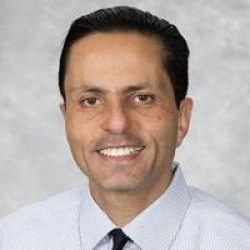Is an injury keeping you from doing things you enjoy? If so, you’re not alone. Injuries can happen to anyone, whether you’re a weekend warrior training for a marathon, a professional athlete, an elementary school student playing soccer or a retiree enjoying a round of golf.
“We see patients from a diverse range of age groups,” explains Frank Moussa, MD, an orthopedic surgeon at HonorHealth Orthopedics who specializes in sports injuries. He notes that sports injuries aren’t always athletic in nature. “That’s because injuries from either intense sports or just an active life are very similar,” he says.
A range of nonsurgical and surgical options
Patients come to Dr. Moussa and his colleagues for help with a variety of injuries or conditions, including knee or shoulder damage, ankle sprains or hip injuries.
He’s found that sometimes patients delay seeing a doctor when they first become injured because they don’t want to have surgery. However, there are many nonsurgical treatment options available to patients.
“I find that 90% of the time we can get the patient better without operating,” he says.
These noninvasive treatments include physical therapy, injection therapy, medications and lifestyle modifications.
When patients do need surgery, advancements in medical and surgical technologies mean most surgical patients experience shorter hospital stays, less blood loss, better pain management and a reduced need for pain medications.
Avoiding injury
Although not every injury is preventable, there are a few things you can do to reduce your chances of getting hurt.
“The best advice I can give is to maintain a general level of fitness and a healthy diet,” says Dr. Moussa.
That’s because exercise and proper nutrition can help you achieve a healthy weight, which puts less stress on the body’s musculoskeletal system. “This will mitigate the level of symptoms from any orthopedic state,” he adds.
“The best part of my job”
Dr. Moussa is dedicated to helping his patients achieve the best possible outcome so they can pursue their passions.
“I still say, 20 years into this, the best part of the job is when someone comes to me and says thank you, my pain is better, and I’m able to do what I wasn’t able to do before,” he says. “The fact that they’re able to return to what they love and think you played a part in it—that makes your day.”
An integrated approach to orthopedic care
At HonorHealth, we understand that you need in-depth, coordinated care when it comes to orthopedics. Our program includes orthopedists throughout the network and at HonorHealth Orthopedics, a fully integrative practice with four convenient Phoenix valley locations in:
- Scottsdale - Shea and Thompson Peak
- Phoenix - Sonoran Crossing
- Glendale - Deer Valley
- Yavapai County - Prescott Valley
“I’m excited to be part of HonorHealth Orthopedics, which offers patients a team of orthopedic subspecialists who take an integrated approach to patient care,” says Dr. Moussa.
Our specialties include revisional knee and hip surgery, orthopedic oncology, wound care, bone health, fracture care and sports injury care—and they’re all conveniently part of the HonorHealth network. That means that if you suspect you're having a problem with your hip, but your doctor determines it's a different kind of injury, your doctor can refer you to another provider within the HonorHealth Orthopedics program for a seamless patient experience.
“This approach helps us provide excellent care while also offering our patients convenience,” adds Dr. Moussa.

